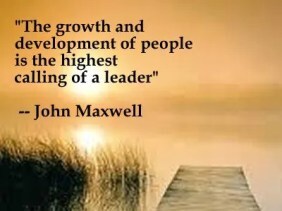Leadership Attributes: Developing Others
 Helping others to develop to their fullest potential is my favorite aspect of leadership. I always enjoyed working with team members and mentees, and still enjoy the mentoring or discipling relationships that I am a part of. There is something about working with individuals who want to grow, improve, and reach their highest potential that energizes me. It’s a joy to see someone achieve their goals, which is oftentimes securing their first formal leadership position.
Helping others to develop to their fullest potential is my favorite aspect of leadership. I always enjoyed working with team members and mentees, and still enjoy the mentoring or discipling relationships that I am a part of. There is something about working with individuals who want to grow, improve, and reach their highest potential that energizes me. It’s a joy to see someone achieve their goals, which is oftentimes securing their first formal leadership position.
Pouring yourself into others was modeled for me early by my career mentor, Mel. I saw the joy he took when one of his staff members developed and moved on to higher levels of responsibility. He wasn’t interested in keeping them on his staff, which would have been comfortable for him in the short-term, but instead “pushed them out of the nest”. They knew he would always be available for mentoring later as needed.
I’ve never turned down anyone wanting to enter into a mentoring or discipling relationship with me, feeling it is what I should be doing as a leader. In addition, even though I’m the mentor, I always learn a lot from these relationships. John Maxwell has written that as a leader, you will never regret the time you invest in people, as raising up others is one of the greatest joys a leader can have. He goes on to say that it is essential to focus on raising others to a higher level.
It is important for mentor leaders to know how they can help others to develop. If it is a current team member, for example, the leader should have a good idea on what is needed as far as development and growth. If it is a mentoring relationship with someone outside of your team, the prospective mentee will need to express those areas that they need help with, to see if is something that the leader can actually help with. For example, if someone approached me to help them to grow in their technical skills, I would tell them that I would not be the best one to help them, and instead refer them to someone better suited to equip them. Also, it’s important to remember that the mentee has to drive the relationship. This helps to make them accountable for showing up to the meetings and doing the necessary pre-work.
Many of my mentoring relationships included reading and discussing a book such as Maxwell’s The 21 Irrefutable Laws of Leadership. Although the content of the book is important, I always found that the discussion around what we read was even more important. Its best to use a book that has questions for reflection and discussion, if possible.
Where I worked, we would at times provide high performing employees development opportunities in which they led a team for 12-18 months. It’s very important to take full advantage of such opportunities. I remember hearing from one of my leaders about an individual who they felt had done the best job of taking advantage of the opportunity given them. That individual has since gone on to have a good career in leadership and has even higher potential.
Another development suggestion is to give employees “stretch” assignments. A “stretch” assignment is outside/above their current level of responsibilities, and one in which success is not guaranteed. An example of such an assignment would be to lead a strategic effort.
Lastly, when helping others to develop, it’s important to help them to get into their “strengths zone”. As I referenced above, leading a highly technical team would not have been a good use of my skills, and would not have served that team well. Maxwell states that good leaders help others find their strength zones and empower them to work in them.
These are just a few of my thoughts about developing others. Entire books have been written on the subject. What would you add to what I have written?



